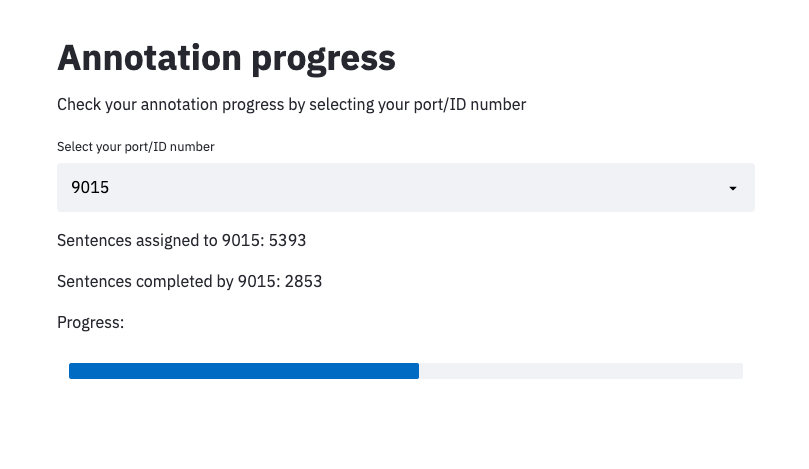ahalterman / Multiuser_prodigy
Projects that are alternatives of or similar to Multiuser prodigy
multiuser_prodigy
This is a multi-annotator setup for Prodigy, Explosion AI's data annotation tool, that uses a Mongo DB to allocate annotation tasks to annotators working on different Prodigy instances running on seperate ports. This use case focuses on collecting gold standard annotations from a team of annotators using Prodigy, rather than on the active learning, single-annotator setup that Prodigy is primarily intended for.
There are a few examples of annotation interfaces in the repo, including code
for annotators working on training an NER model or doing sentence
classification with document context. Each annotator works on the Prodigy/port
assigned to them, and a new DBStream class handles pulling the examples from
Prodigy that are assigned to each worker.
I've used this setup for three major annotation projects now, but you'll need to modify the code to get it working for your project as well.
Mongo database
All tasks are stored in a Mongo DB, which allows different logic for how tasks are assigned to annotators. For instance, examples can go out to annotators until three annotations are collected, examples could go to two predetermined annotators from the wider pool, or annotations can be automatically resubmitted to a third annotator if the first two annotations disagree.
You can start a Mongo DB in a Docker container:
sudo docker run -d -p 127.0.0.1:27017:27017 -v /home/andy/MIT/multiuser_prodigy/db:/data/db mongo
To load a list of tasks into the database:
python mongo_load.py -i assault_not_assault.jsonl -c "assault_gsr"
where -i is a JSONL file of tasks and -c specifies the collection name to
load them into.
"seen" : {"$in" : [0,1]}}, {"coders"
Running
You'll need to modify the code of multiuser_db.py to access the right
collection, set the names/ports of annotators, and the desired interface (NER,
classification, etc).
Then you should launch the processes either in a screen or in the background:
python multiuser_db.py
Analysis
You can use Streamlit to set up a dashboard so annotators can check their progress. This one pulls results from the Mongo DB, but you could also call the Prodigy DB and show results from there.
A more complicated analysis dashboard setup is in
Report.Rmd. This RMarkdown file reads in a CSV of coding information and
generates figures in an HTML page that can be served from the annotation
server. To record information about how long each task takes, add something
like eg['time_loaded'] = datetime.now().isoformat() to your stream code and
something like eg['time_returned'] = datetime.now().isoformat() to your
update code. report_maker.py exports the DB to CSV and knits the RMarkdown on
that CSV.

